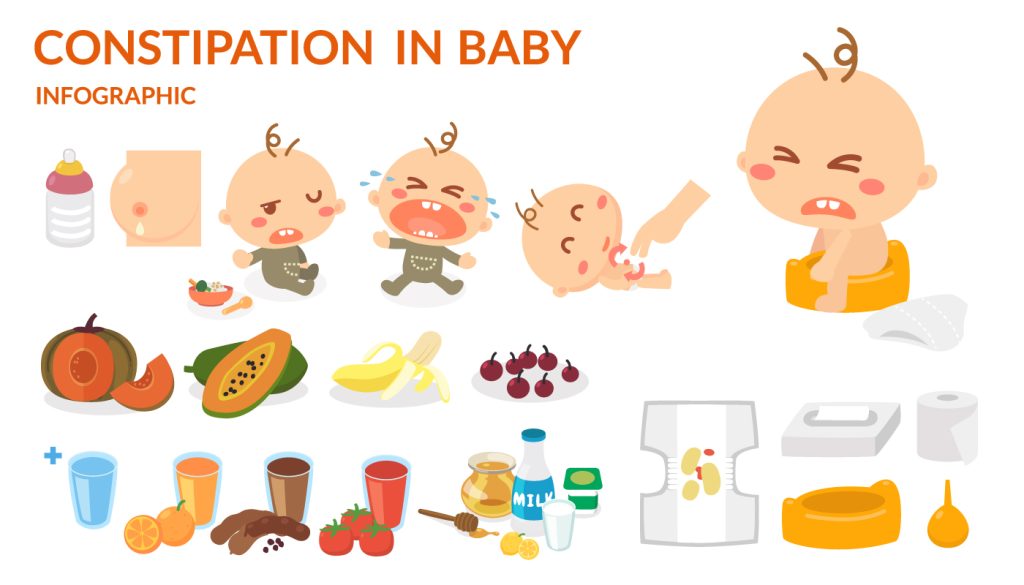How To Relieve Constipation In Babies Quickly?
Are you a parent who has ever seen their baby struggling during bowel movements? Have you noticed your baby squirming, grunting, or showing signs of discomfort? If yes, then you’re not alone.
As a caregiver, it’s natural to feel concerned about your little one’s digestive health. But did you know that constipation in infants is a common issue that can be easily managed with a few simple steps?
In this blog, “How To Relieve Constipation In Babies Quickly?” we’re going to share some quick and natural ways to ease your baby’s constipation and promote healthy digestion. So, are you ready to learn about the signs of constipation, the causes to watch out for, and preventive measures that can help maintain regular bowel movements in your little one?
Let’s dive in and empower you with the knowledge needed to support your baby’s digestive health.
Introduction to Baby Constipation

Babies experiencing constipation can be pretty uncomfortable and distressed. It occurs when they have infrequent, complex, and painful bowel movements. Constipation in infants is a common concern for parents and caregivers, and it’s essential to address it promptly to alleviate their discomfort.
Bowel movements vary among infants, and what may be normal for one baby might not be for another. However, if a baby has fewer bowel movements than usual, passes hard and dry stool, or appears to be straining during a bowel movement, they may be experiencing constipation.
It is essential to provide relief from constipation quickly, as prolonged constipation can lead to further discomfort and a negative impact on a baby’s overall well-being.
By understanding the signs, causes, and home remedies for relieving constipation in infants, parents and caregivers can help promote healthy digestion and bowel movement.
In the following sections, we will explore the signs and symptoms, causes, prevention methods, home remedies, and when to seek medical help for baby constipation. Stay tuned for effective strategies on how to relieve constipation in babies quickly.
Signs and Symptoms of Baby Constipation

Constipation in babies can be concerning and uncomfortable. As a parent or caregiver, it’s essential to be aware of the signs and symptoms of constipation in infants. Recognizing these indicators early on can help initiate appropriate relief measures and promote your baby’s digestive health.
Here are some common signs to watch out for:
1. Hard and Dry Stool
One of the telltale signs of constipation is when your baby’s stool becomes hard, dry, and difficult to pass. It may resemble small pellets or be larger than usual.
2. Infrequent Bowel Movements
If your baby is having fewer bowel movements than usual or passing stool less frequently, constipation could be the cause. Keep track of their regular pattern to identify any significant changes.
3. Straining and Discomfort
Constant straining and discomfort while trying to have a bowel movement can indicate constipation. Your baby may express discomfort by crying, fussing, or showing signs of agitation.
4. Abdominal Pain and Bloating
Babies experiencing constipation often have abdominal pain and bloating. You may notice their tummy feels firm or distended to the touch.
5. Lack of Appetite
Constipation can affect a baby’s appetite and lead to reduced feeding. They may show a decreased interest in breast milk, formula, or solid foods.
6. Foul-Smelling Gas
If your baby’s gas has a particularly strong and unpleasant odor, it may be due to constipation. This occurs when gas gets trapped in the intestines.
If you observe these signs and symptoms in your baby, it’s crucial to take action to alleviate their discomfort and promote regular bowel movements.
In the following sections, we will explore the causes of baby constipation, prevention, home remedies, and when to seek medical help. Remember, understanding and addressing constipation in its early stages is crucial for your baby’s well-being.
Causes of Baby Constipation

Constipation in infants can be attributed to various factors, including changes in diet, dehydration, and underlying medical conditions. Understanding the potential causes can help parents and caregivers take proactive measures to prevent and address constipation in babies.
Changes in Diet
Introducing solid foods or making changes to a baby’s diet can disrupt their digestive system, leading to constipation. As young babies transition from a liquid-only diet to solid foods, their bodies may take some time to adjust.
Moreover, certain foods, such as rice cereal, bananas, and dairy products, are known to be binding and can contribute to constipation in some infants. Gradually introducing new foods while ensuring a balanced diet can help prevent constipation.
Dehydration
Inadequate fluid intake can lead to dehydration and subsequently result in constipation. It is essential to ensure that infants, especially those on a formula or solid food diet, receive adequate hydration.
Offering breast milk or formula regularly and including water as a supplement for older babies can help maintain proper hydration levels and promote regular bowel movements.
Underlying Medical Conditions

In some cases, constipation in infants may be associated with underlying medical conditions. These conditions can include hypothyroidism, intestinal blockages, or anatomical abnormalities.
If constipation persists despite dietary adjustments and hydration, consulting a healthcare professional is important to rule out any underlying medical concerns and determine the appropriate course of action.
By recognizing these common causes of constipation in infants and taking preventive measures, parents and caregivers can help promote healthy digestion and ensure regular bowel movements for their little ones.
Prevention of Baby Constipation

Preventing constipation in babies is crucial for their overall comfort and well-being. By following a few simple tips and strategies, you can help promote regular bowel movements and maintain a healthy digestive system.
Here are some effective ways to prevent constipation in infants:
1. Balanced Diet
- Ensure that your baby’s diet includes a good balance of fiber-rich foods.
- If your baby has started consuming solid foods, offer fruits and vegetables that are high in fiber, such as prunes, pears, and peas.
- Fiber helps soften the stool and ease bowel movements.
2. Adequate Hydration
- Make sure your baby is well-hydrated by offering them enough fluids throughout the day.
- For breastfed babies, ensure they are frequently nursing.
- For formula-fed infants, follow the feeding guidelines recommended by your healthcare provider.
3. Proper Feeding Techniques
- When introducing solid foods, pay attention to the texture and consistency.
- Gradually increase the texture from purees to mashed and soft solids to encourage chewing and swallowing.
- This helps in the proper digestion of food and prevents constipation.
4. Regular Meal Times
- Establish a routine for feeding your baby.
- Consistent meal times help regulate bowel movements and promote a healthy digestive system.
- Avoid unnecessary delays or skipping meals, as irregular feeding patterns can contribute to constipation.
5. Physical Activity
- Encourage active playtime for your baby.
- Physical movement stimulates the muscles in the digestive system, aiding in regular bowel movements.
- Gentle exercises like bicycling or tummy time can promote healthy digestion.
6. Avoid Constipating Foods
- Limit the consumption of constipating foods such as rice cereal, bananas, and refined grains.
- These foods are low in fiber and can contribute to constipation.
- Instead, opt for foods that are known to have a mild laxative effect, like prunes or prune juice.
Remember, each baby is unique, and it may take some time to understand what works best for your little one. If you have concerns about your baby’s bowel movements or suspect constipation, consult your healthcare provider for appropriate guidance and support.
Following these preventive measures can go a long way in maintaining regular bowel movements and ensuring your baby’s comfort.
Home Remedies: How To Relieve Constipation In Babies Quickly?

Babies experiencing constipation can be uncomfortable and distressed. As caregivers, it’s essential to know effective and natural home remedies to provide them with relief. Here are seven remedies that can help alleviate constipation in infants:
1. Increase Fluid Intake
- Offer breast milk or formula more frequently to ensure your baby stays hydrated.
- If your baby is six months or older, you can also introduce small amounts of water, especially during hot weather.
2. Try Fruit Juice
- Prune juice, pear juice, or apple juice can be effective in relieving constipation.
- Begin with a small amount (around 1-2 ounces) and gradually increase if necessary.
- Always consult with your pediatrician before offering fruit juice.
3. Modify Diet
- If your baby has started solid foods, introduce high-fiber options like pureed prunes, pears, or peas.
- Fiber helps soften stools and promotes regular bowel movements.
4. Give a Tummy Massage
- Gently massage your baby’s tummy in a clockwise direction.
- This can help stimulate their digestive system and facilitate bowel movements.
5. Apply Warm Compress
- Place a warm compress on your baby’s abdomen for a few minutes.
- The warmth can help relax the muscles and relieve constipation.
6. Encourage Physical Activity
- Regular movement can aid in maintaining healthy digestion.
- Engage in activities like tummy time, gentle leg bicycling, or a warm bath to stimulate bowel movements.
7. Consider Probiotics
- Probiotics are beneficial bacteria that can help regulate the digestive system.
- Consult your healthcare professional before introducing probiotics to your baby.
Remember, it’s crucial to closely monitor your baby’s response to these remedies and consult with a healthcare professional if the constipation persists or worsens. Additionally, always seek medical advice if your baby experiences severe pain, blood in their stool, or shows signs of dehydration.
Implementing these simple home remedies can provide relief for your baby and promote regular bowel movements. However, each baby is unique, and what works for one may not work for another. Find the remedies that suit your baby’s needs and ensure their comfort and well-being.
More Sources to study:
- American Academy of Pediatrics. (2015). Understanding Constipation. HealthyChildren.org. https://www.healthychildren.org/English/health-issues/conditions/abdominal/pages/Understanding-Constipation.aspx
- United Kingdom’s National Health Service. (2018). Can babies have juice? https://www.nhs.uk/common-health-questions/childrens-health/can-babies-have-juice/
When to Seek Medical Help

If your baby is experiencing constipation, most cases can be effectively managed at home using natural remedies and lifestyle changes. However, there are certain situations where seeking medical help is necessary to ensure your baby’s health and well-being.
Here are some signs and scenarios that indicate it’s time to contact a healthcare professional:
1. Severe Discomfort
- If your baby appears to be in extreme discomfort, experiencing intense pain, or has been crying inconsolably for an extended period, it’s essential to seek medical advice.
- Severe discomfort could indicate an underlying issue that requires professional assessment.
2. Blood in Stool
- If you notice any blood in your baby’s stool, it is crucial to consult a healthcare provider promptly.
- Blood in the stool can indicate a more severe condition and should not be ignored.
3. Failure to Pass Stool
- If your baby hasn’t had a bowel movement for more than a week, medical intervention is necessary.
- Prolonged periods without passing stool can be a sign of an obstruction or other digestive issues that require attention.
4. Vomiting or Refusal to Feed
- If your baby experiences persistent vomiting or refuses to feed along with constipation, it is essential to seek medical assistance.
- These symptoms could indicate an underlying condition that requires investigation and treatment.
5. Presence of Abdominal Mass
- If you notice a hard or swollen mass in your baby’s abdomen, it’s important to contact a healthcare professional.
- An abdominal mass could indicate a more severe problem that needs immediate evaluation.
Remember, every baby is unique, and their response to constipation may vary. If you have any concerns or doubts about your baby’s health, don’t hesitate to consult a healthcare provider. They can provide guidance and support, ensuring your baby receives the appropriate care and treatment.
“While home remedies are often effective in relieving baby constipation, it’s important to trust your instincts as a caregiver. If something feels off or your baby’s symptoms persist or worsen, reaching out to a healthcare professional is always the best course of action.” Dr. Emily Johnson, Pediatrician
By staying vigilant and attentive to your baby’s well-being, you can ensure they receive the necessary medical help when needed, promoting their healthy development and comfort.
FAQs: How To Relieve Constipation In Babies Quickly?
As a parent or caregiver, it’s natural to have questions about baby constipation. Here are some frequently asked questions, along with informative answers and practical advice:
Remember, each baby is unique, and what works for one may not work for another. If you have any concerns or questions about how to relieve constipation in babies quickly, it’s always best to consult with a healthcare professional for personalized advice and guidance.







